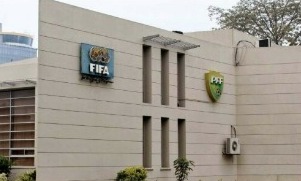Mohsen Gilani PFF President: A new chapter has begun for Pakistan football as Mohsen Gilani, the former FIFA development officer, was elected president of the Pakistan Football Federation (PFF). His unexpected victory over rival Taha Alizai signals a hopeful shift in the governance and future of the sport in the country.
An Unexpected Upset
The PFF elections, held for the first time in a decade, were anything but predictable. Mohsen’s opponent, Taha Alizai—the founder of Karachi United—appeared to hold the upper hand going into the final stages of campaigning. As late as Monday evening, Taha’s camp claimed the support of 13 out of the 24 PFF Congress members, seemingly placing him in pole position.
However, election day told a different story. With a secret ballot and persistent lobbying continuing until the last moment, Mohsen emerged victorious, winning 13-11 in both rounds of voting. The first round required a two-thirds majority, but with the same margin of 13-11 repeated, Mohsen sealed his presidency, turning what many had seen as a foregone conclusion into a remarkable underdog story.
Mohsen’s Vision for Football
Following his win, Mohsen addressed the media, declaring that his victory was not just personal but a win for Pakistan football as a whole. “Achieving anything meaningful is difficult,” he remarked, adding, “The important thing is that after years of crisis, we now have an elected leadership to steer Pakistan football forward.”
The newly elected president promised inclusivity and cooperation. His message was clear: the PFF would no longer be a battleground of opposing factions but a unified body working toward shared goals. Two of the three vice-presidents elected belonged to Taha’s panel, further reinforcing Mohsen’s call for unity. “We are one football family, and we will work together,” he emphasized.
The Road to Leadership
Mohsen has been an influential figure in Pakistan football for years, albeit largely behind the scenes. His decision to step into the spotlight came after the FIFA-appointed Normalisation Committee (NC) initiated elections to resolve governance issues that had plagued the PFF since 2015.
“Pakistan football has suffered from governance failures for far too long,” Mohsen noted. “This was the right time to act and bring change.” His alliance with another presidential candidate, Hafiz Zakaullah, was a strategic move that significantly boosted his chances. Zaka eventually withdrew from the race, aligning with Mohsen’s vision to “develop football together” rather than compete for leadership.
A Sport in Crisis
The PFF’s struggles are well-documented. The federation’s last elections, held in 2015, marked the beginning of years of turmoil and administrative deadlock. In 2019, FIFA intervened, appointing a Normalisation Committee to oversee the federation. Despite its mandate, it took the committee six years to pave the way for fresh elections.
This prolonged crisis severely hampered the development of football in Pakistan, from grassroots initiatives to national team performance. The need for stable governance became increasingly urgent, making the recently concluded elections a pivotal moment for the sport.
Election Outcomes and Future Challenges
By the time the elections wrapped up, both panels had secured key positions in the PFF’s executive structure. Mohsen’s panel claimed two executive committee seats from Punjab, while Taha’s team won seven seats and two vice-presidential spots. Dr. Mohammad Ali and Naveed Aslam Lodhi, both from Taha’s camp, were elected as vice-presidents alongside Zaka from Mohsen’s alliance.
Two remaining executive committee positions from Khyber Pakhtunkhwa will be decided in the next PFF Congress. Despite the divided results, Mohsen expressed confidence in the new leadership’s ability to work cohesively. “The beauty of this election is that both panels are represented. This is a chance to move beyond the acrimony of the past and work for the betterment of Pakistan football,” he said.
Governance and Development as Priorities
As the PFF transitions from the NC to elected leadership, Mohsen’s immediate focus will be addressing the governance issues that have long hindered the sport. “Governance is at the heart of our problems,” he admitted, outlining a multi-faceted plan for the federation’s revival.
The new leadership aims to:
- Strengthen governance structures to prevent future crises.
- Establish competitive tournaments to enhance the domestic football scene.
- Prioritize the progress of the national team in international competitions.
- Invest in technical development, including producing more qualified coaches and referees.
Building Bridges with Government Institutions
Government institutions and departments largely supported Taha during the elections, but Mohsen has called for their collaboration with the new PFF leadership. “We must promote Pakistan’s image through football,” he said, highlighting the potential of the sport to foster diplomacy, international cooperation, and tourism.
Acknowledging the critical role of government backing, he added, “Without their support, our goals cannot be achieved.”
Looking Ahead: A Shared Vision
The inclusion of members from both panels in the new PFF leadership is a promising sign of unity. With the election of a diverse executive committee and vice-presidents, there is hope that Pakistan football can finally break free from its cycle of internal conflict.
“We must focus on the future,” Mohsen reiterated, urging all stakeholders to prioritize the sport’s development over past grievances. His vision for the PFF’s role extends beyond the pitch, aiming to make football a symbol of progress and unity in Pakistan.
As the PFF embarks on this new chapter, much remains to be done. The path to restoring the sport’s credibility and vibrancy will be challenging, but Mohsen’s leadership, coupled with a commitment to inclusivity and reform, offers a beacon of hope for Pakistan football enthusiasts.
Conclusion
The PFF elections have set the stage for a transformative period in Pakistan football. Mohsen Gilani’s unexpected victory symbolizes a shift in priorities, from factionalism to collaboration and from crisis management to meaningful development. While the challenges ahead are significant, this historic moment has rekindled optimism for a brighter future for football in Pakistan.
